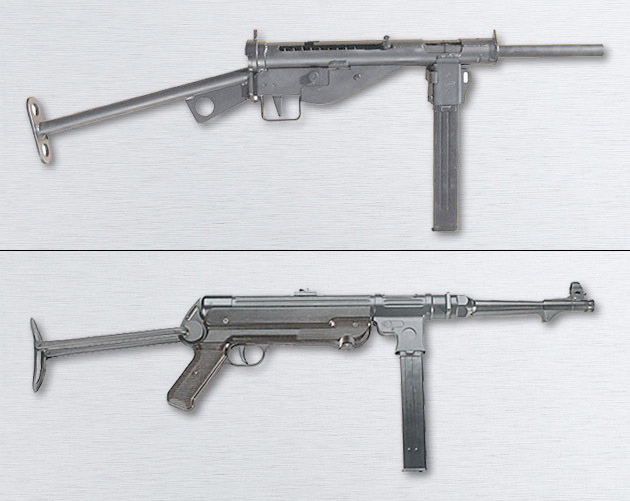Six years after approving German-made rifles that can be converted to machine guns “in minutes” – guns that by law should have been prohibited to begin with – the federal government will spend up to $260,000 buying them from their owners.

In February 2007, the RCMP classified the SSD BD38, a semi-automatic replica of a German Second World War-era sub-machine gun, as a ‘restricted’ firearm, meaning that it had the same legal status as a handgun. That classification was based on a description from an importer that wanted to sell the gun in Canada.
Canadians could buy them if they met stricter licence standards than those faced by owners of mainstream rifles and shotguns. Restricted-class licence holders face extra safety testing compared to owners of mainstream rifles and shotguns, and tighter restrictions on how they can transport and fire their weapons.
The RCMP didn’t test the BD38 until April 2012 – prompted, according to a memo written that summer, by “reports that the weapons could be converted to automatic fire.” They found the rifle could be made into a working sub-machine gun “in minutes by making minor modifications to the … trigger mechanism using common items such as wire and small pieces of metal,” explained a briefing note to Public Safety Minister Vic Toews written in August of last year.
Automatic weapons – firearms ‘capable of automatic fire’ – are prohibited in Canada. In a 1993 ruling the Supreme Court ruled that ‘capable’ included firearms “capable of conversion to an automatic weapon in a relatively short period of time with relative ease.”
In March, the RCMP published a bulletin for police saying that the BD38 and a similar weapon, the BD3008, had been prohibited, and compensation offered to owners. The bulletin asked local police forces to co-operate in seizing them.
“Since the SSD model BD38 and BD3008 firearms are easily convertible to fully automatic fire, they pose a risk to public safety,” the bulletin said.
- Retired Quebec teacher buys winning lottery ticket at last minute, wins $40M
- N.B. election: Higgs went to ‘very dark place’ with Liberal joke, opponent says
- GM, Volvo, Land Rover vehicles among those in big recall. What to know
- NDP want competition watchdog to probe potential rent-fixing by landlords
When they were being sold, BD38s cost about $3,000 each. The cost of expropriating the weapons, paid as compensation to owners, was estimated at $230,000 but has since risen to $260,000.

Get breaking National news
Global News’s copy of the firearms database shows 74 BD38s and six BD3008s owned in Canada.
Sixty-eight of the firearms have been seized, RCMP Sgt. Julie Gagnon told Global News in an e-mail this week. “The rest are in progress, with follow-up as appropriate”. Sixty-one owners have been compensated, at up to $3,500 each. Of the total compensation budget, about $187,000 has been spent so far, Gagnon said.
Owners have the option of going to court to dispute the seizure.
The rifles were imported by several Canadian gun dealers, including Marstar, a gun retailer in Vankleek Hill, east of Ottawa.
“For security reasons, I will not discuss any aspect of our business,” said president John St. Amour, asking Global News to e-mail a list of questions. (They were not answered.)
Both rifles are made by Sport-Systeme Dittrich, a gunmaker based in Kulmbach, Germany. The company specializes in working reproductions of German weapons from the Second World War.
The BD38 was originally categorized as restricted based on a description from the importer, Gagnon said, which “led the Canadian Firearms Program CFP to form an opinion that it was a restricted-class firearm … and issue registration certificates as such.”
A similar situation arose in 2010 with a Chinese-made rifle, a January 2012 Public Safety memo explains. After several dozen Norinco Type 97As had been imported, the RCMP ruled that they were “purpose-made fully automatic firearms that had been temporarily modified to be semi-automatic.” Owners were offered up to $1,400 by the RCMP to surrender their weapons.
“As classification of firearms is a manual process, from time to time there are errors that need to be corrected,” said Julie Carmichael, a spokesperson for Public Safety Minister Vic Toews.
Blair Hagen of the National Firearms Association sees a wider political agenda at work in prohibiting a small segment of firearms.
“We still have registration of restricted and prohibited firearms. So the RCMP knows where those guns are, and who has them. They feel that if they can target these low-number guns, which all seem to be high-dollar guns that are attractive to gun collectors and well-off gun enthusiasts, they can set a precedent going forward that more guns should become reclassified,” he said.
“When the political situation allows for it, perhaps through a national tragedy, or a change in government where there is an interest in gun control, they can facilitate a mass confiscation of certain firearms, or all semi-automatic firearms.”
Watch: A BD38 being fired with a five-round magazine legal in Canada for this type of firearm






Comments